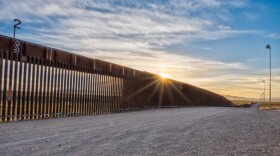From Marfa Public Radio:
Late Wednesday, President Donald Trump signed a proclamation directing the deployment of National Guard troops as a quote “immediate deterrent” to illegal immigration along the U.S.- Mexico border.
This comes after days of tough talk from President Trump on immigration enforcement, including Tweeting that he’d secure the border through military force until his proposed border wall is complete. The news is being met with some mixed reaction on Texas’ southern border.
Texas already has some National Guard troops performing surveillance on the border right now. And it’s not yet clear how much of an influx the state could see in the coming days or weeks.
“We’ve kind of been through that before with the National Guard,” says John Ferguson, mayor of Presidio, Texas, a border town of about 4,500 people in the Big Bend region. He’s taking the news in stride.
“We all feel like the border is safe – those of us who live here – would say it’s safe already. But there’s nothing wrong with having a little bit more eyes and ears on the ground”
As Ferguson points out, this isn’t the first time a wave of national guard has been sent to the Texas-Mexico border. Troops have been coming on missions since the Reagan administration. In 2010, then-President Barack Obama sent some 1,200 National Guard troops to the border. And Rick Perry deployed guard units while he was Governor of Texas.
“I don’t have a major objection to the National Guard being in the area providing backup,” says Ferguson. “If they’re there to assist the Border Patrol, and Border Patrol wants and appreciates it, then I don’t think that’s necessarily a bad thing at all.”
To fulfill Trump’s directive, the Pentagon and homeland security will work with governors of states along the U.S.-Mexico border. In a statement Wednesday, Texas Gov. Greg Abbott agreed with the move, saying this “reinforces Texas’ long standing commitment to secure our southern border..”
What Mayor Ferguson is concerned about is accountability from the federal government.
“Depending on how long the National Guard would be stationed on the border, I think you need to be able to say, ‘OK what effect is this presence having on the border?'”
That’s the big question for this small community.
Ferguson’s lived in Presidio for about 30 years. When he’s not at City Hall, he’s down the street working at Presidio High School. That’s where Laurie Holman has been teaching art since the late 90s. Holman says the whole idea makes her a bit nervous.
“If anything it’s going to make me more alert, more wary, more concerned,” says Holman.”If I wanna go out with my shotgun and I’m worried about rattlesnakes…now I gotta worry about some 18-year-old, 19-year-old National Guard guy shooting me because he’s thinking that I’m doing something wrong or illegal.”
She remembers a time when this part of the border was far more militarized, in a government effort to curb drug smuggling.
Thirty-seven-year-old Velva Saenz remembers too. She works at a store just off the city’s main street. Saenz has mixed feelings about an increased security presence in town.
“I really don’t know, I would think this should make us feel more safe,” she says, standing behind her father’s hardware store.
But most people here, she says, already leave their doors unlocked and know their neighbors, both in Presidio and across the border.
Her hesitation: “Because of what happened a couple years ago with Ezekiel, it kind of makes you think about it.”
Esequiel is Esequiel Hernandez, who Saenz went to school with. In 1997, the 18-year-old, who lived about 20 miles from here, was shot and killed by Marines on a drug-surveillance mission. Saenz says this week’s news and talk of a more militarized border, has kept Hernandez on her mind.
“He graduated with me,” Saenz says. “So we lived it with him. It makes you think twice whether it’s safe or not.”
Hernandez’s death can be seen as an extreme-worse-case scenario. But here in Presidio, those events are still vividly remembered.
Mayor Ferguson hopes, in the long run, the Trump administration works with the U.S.’s southern neighbors to tackle the factors that motivate people to cross the border in the first place.
“Things that might help them actually stay in their countries and make a decent wage,” he says. “And not feel like they have to leave, go north and take anything they can find just to survive.”
For now, residents want to find out more about how many troops could be coming and exactly how long they’d stick around.


